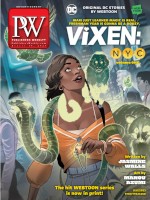Adrian Tomine’s graphic novel Shortcomings was published in 2007, and shortly thereafter, actor Randall Park picked it up at the indie culture mecca Giant Robot. Fast-forward 16 years, and the live-action Shortcomings film adaptation directed by Park, with a screenplay by Tomine, is now in theaters. Starring Justin H. Min as prickly protagonist Ben, with fellow Asian American actor Sherry Cola as his wisecracking lesbian bestie, the film marks the culmination of many years of shared effort to bring the comic’s biting social commentary to the screen. Marketing director Julia Pohl-Miranda reports that Drawn & Quarterly immediately returned to press for the “perennial bestseller” backlist title when the film was announced.
How true to the graphic novel is the film adaptation?
I would say the finished film is probably 90% faithful to what I wrote in my script—which is a pretty good average. A lot of the more holistic or conceptual changes to the work, whether in terms of character, tone, a shift in some plot elements and updates to make it present day, were all done by me—some in consultation with the director and other people involved in the film.
The film uses chapter titles to break up scenes. Was that to make it feel more like the graphic novel?
What’s funny is that there have been two films that have adapted my work: Shortcomings and a French film called Paris, 13th District. Both used that same device. My hunch is that it is an attempt to connect it to the print origins of the material.
The graphic novel is in black-and-white and the film is in color. What informed this significant stylistic change?
The original version of the film that Randall and I talked about was going to be in black-and-white. I loved the idea. But the realities of financing took over, and I was like, “Let’s forget it.” There are enough hurdles trying to get any movie made these days, let alone this one, which down the credit list features people leveling up or doing this for the first time. From day one, we wanted to be very conscious of being economical and making choices that would allow the film to be made.
What are some surprising questions you’ve encountered along this journey?
I am hearing a response that this is a story about Asian Americans acting shitty and that we’re entitled to that now. I have no desire to control people’s response to the work, but I’m a little surprised. No one ever asks, “Did I find Tom Cruise likable as he puts a bullet in someone’s head?” I feel a bit caught off guard by the standards people have in terms of movies.
Do you think this film advances Asian American representation in cinema?
I do. I tried to write the movie you want to see that hasn’t been made before. I have always liked realistic, grounded comedies and lower-key films where you’re dropped into a life for a little while and experience the day-to-day goings-on. I think for a long time different minority groups have grappled with, “What kind of image do we want to put out in the broader world? Are we trying to create an idealized, perfect vision, or are we to the point where we can start to nuance it, confess, admit, and challenge?” The latter was my goal.



 Volume 270
Issue 33
08/14/2023
Volume 270
Issue 33
08/14/2023





